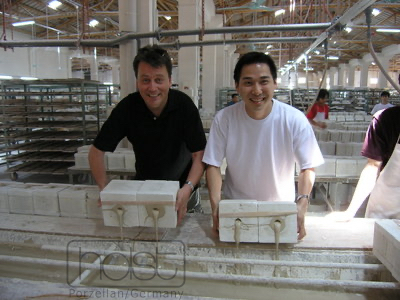Plaster moulds
Plaster moulds in porcelain production
Gypsum is a natural mineral from the sulphate class with a hygroscopic effect and is mined in quarries. In general, gypsum is a white or colourless substance that is enriched with foreign ions and clay minerals for processing in the porcelain industry. Gypsum has a hardness of 2 Mohs and a density of approx. 2.3 g/cm3. In order to use gypsum as a production aid, it must be crushed, ground and processed in crushing mills and then boiled and fired.
The essential components for the use of plaster in mould making in the porcelain industry are:
- the plasticity of plaster (mouldability)
- the low water solubility
- hygroscopicity (water attraction)
- easy procurement
- the low price
Plaster & porcelain

In porcelain production, plaster moulds are used for the premould and for the working moulds.
The hygroscopic properties of gypsum remove moisture from the porcelain mass. No other material known to us offers the properties of such good plasticity and hygroscopicity. In the processing of plastic masses (Hubel) and above all casting masses, gypsum is virtually indispensable as a basic material for production moulds to this day.
The positive effect of the plaster mould is most evident in the casting process. The liquid porcelain adheres to the walls of the plaster mould. The hygroscopic property of plaster virtually "sucks out" the water at the point of contact. The longer the porcelain mass remains in the mould, the more moisture the plaster draws out of the mass. The porcelain mass solidifies, grows and becomes thicker and thicker.
During the production of plaster moulds, the basic material can be mixed with additives, e.g. resins, polymers or plastics, which support or change the properties of the plaster material. The recipe varies from production to production - or from country to country. As a rule, attempts are made to increase the stability of the gypsum material (durability) or to control the hygroscopic properties. Particularly in Asian countries - with temperatures of 30 °C and above and a humidity of between 75 and 95% - these climatic conditions severely restrict the hygroscopic properties of natural gypsum. This negative effect is much stronger with cast items than with twisted or rolled goods.
Depending on the type of product, the moulding and the customer's quality requirements, between 3 and 15% non-saleable plaster is produced per 1 kg of porcelain as a saleable finished product. Read more about the half-life of plaster moulds.
